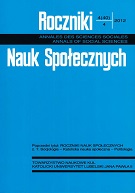Nacja, dyseminacja i trzecia przestrzeń. Wkład Homi K. Bhabha do teorii tożsamości zbiorowej
Nation, dissemination and third space. Contribution of Homi K. Bhabha into the theory of collective identity
Author(s): Angelika Zahn, Gerhard WagnerSubject(s): Social Sciences
Published by: Towarzystwo Naukowe KUL & Katolicki Uniwersytet Lubelski Jana Pawła II
Keywords: nation; dissemination; identity; Homi K. Bhabha; naród; dyseminacja; tożsamość
Summary/Abstract: The authors present the concept of Homi K. Bhabha, literature expert and representative of postcolonialism, and its contribution into the theory of collective identity. In fact, Bhabhabelieves that each nation is exposed to dissemination. Nowadays, national identity is only possible as a result of negotiations taking place in the third space between old national elites and new minorities. Thus, one may claim that Bhabhatakes a constructivist standpoint which became consolidated in the 1980s in the research into social sciences, which means that the nation is essentially treated not as the essence but as a product of construction. Yet, Bhabhadoes not follow that standpoint uncritically, because in his opinion, it treats the construction of a nation in an excessively unilateral manner. He compares the process involving creation of national identity to development of individual identity as defined in psychoanalysis. Indeed, Bhabha’s psychoanalytical assumptions emphasise what is strange, what is remarkable, what is not integrated in the prevailing opinion, but what is continuously threading its way towards national narration, yet its appearance is not controllable. Not only is the future ahead of us, but so is the past, as claims Bhabhafrom the psychoanalytical perspective, because new articulation and the shift of meaning on the margins of national community forcecontinuous re-establishment of traditions.
Journal: Roczniki Nauk Społecznych
- Issue Year: 40/2012
- Issue No: 4
- Page Range: 19-39
- Page Count: 19
- Language: Polish

